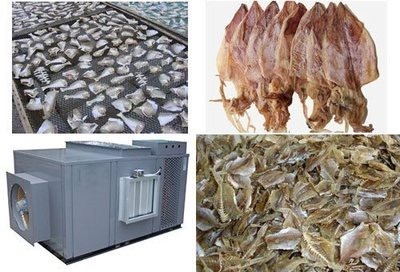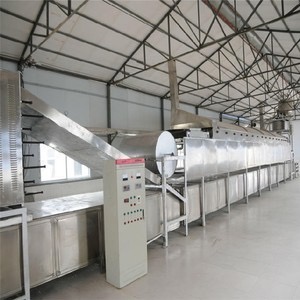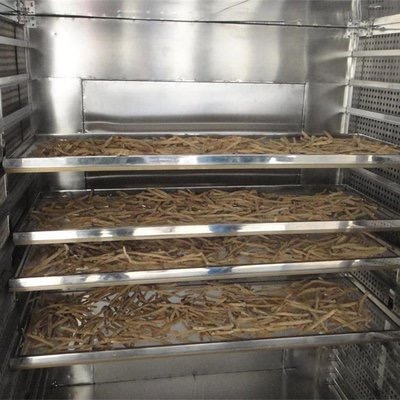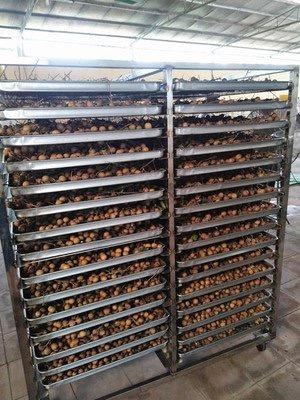
Content Menu
● Introduction
● Understanding Heat Pump Technology
>> Key Features of Heat Pump Dryers
● Energy Efficiency
● Temperature Control
● Humidity Control
● Versatility
● Capacity
● User-Friendly Interface
● Durability and Build Quality
● Safety Features
● Maintenance and Cleaning
● Cost-Effectiveness
● Benefits of Using Heat Pump Dryers
● Conclusion
● Frequently Asked Questions
>> 1. What types of food can be dried using a heat pump dryer?
>> 2. How does a heat pump dryer differ from a traditional dryer?
>> 3. What maintenance is required for a heat pump dryer?
>> 4. Can heat pump dryers be used for commercial purposes?
>> 5. What is the average lifespan of a heat pump dryer?
Introduction
In the world of food processing, drying is a crucial step that helps preserve food, enhance flavors, and extend shelf life. As a leading manufacturer of food drying machines in China, we specialize in providing OEM services to international food drying brands, wholesalers, and manufacturers. This article will explore the essential features to consider when selecting a food drying machine, particularly focusing on heat pump technology, which is becoming increasingly popular in the industry.

Understanding Heat Pump Technology
Heat pump dryers utilize a unique technology that allows them to efficiently remove moisture from food products. Unlike traditional drying methods that rely on direct heat, heat pump dryers use a closed-loop system to recycle heat, making them more energy-efficient and environmentally friendly. This technology is particularly beneficial for drying sensitive food items, as it operates at lower temperatures, preserving the nutritional value and flavor of the food.
Key Features of Heat Pump Dryers
When selecting a heat pump dryer for food processing, several key features should be considered:
Energy Efficiency
Heat pump dryers are known for their energy efficiency. They consume significantly less energy compared to conventional dryers, which can lead to substantial cost savings over time. Look for models with high energy efficiency ratings to ensure optimal performance. The ability to recycle heat means that these dryers can operate with lower energy consumption, making them an excellent choice for businesses looking to reduce their operational costs.
Temperature Control
Precise temperature control is essential for drying various food products without compromising their quality. A good heat pump dryer should offer adjustable temperature settings, allowing operators to customize the drying process based on the specific requirements of the food being dried. This feature is particularly important for delicate items like herbs and fruits, which can easily lose their flavor and nutritional value if exposed to excessive heat.
Humidity Control
Effective humidity control is crucial for achieving consistent drying results. Advanced heat pump dryers come equipped with humidity sensors that monitor moisture levels in real-time, adjusting the drying conditions accordingly to prevent over-drying or under-drying. This feature ensures that the final product meets quality standards and reduces the risk of spoilage.
Versatility
A versatile heat pump dryer can handle a wide range of food products, from fruits and vegetables to meats and herbs. Look for models that offer multiple drying programs or settings tailored to different types of food. This versatility allows businesses to expand their product offerings and cater to diverse customer preferences.

Capacity
The capacity of the dryer is an important consideration, especially for commercial operations. Choose a model that can accommodate your production needs, whether you are a small-scale producer or a large manufacturer. Larger capacity dryers can process more food at once, increasing efficiency and reducing drying time.
User-Friendly Interface
A user-friendly control panel with clear displays and intuitive navigation can significantly enhance the drying process. Look for models that offer programmable settings and easy-to-read indicators. This feature is particularly beneficial for operators who may not have extensive technical training, allowing them to operate the machine with ease.
Durability and Build Quality
Food drying machines are an investment, so it’s essential to choose a model that is built to last. Look for dryers made from high-quality materials that can withstand the rigors of daily use in a commercial setting. A durable machine will require less frequent repairs and replacements, ultimately saving money in the long run.
Safety Features
Safety should always be a priority in food processing. Ensure that the heat pump dryer is equipped with safety features such as overheat protection, automatic shut-off, and alarms for any malfunctions. These features help prevent accidents and ensure that the drying process is safe for operators and the food being processed.
Maintenance and Cleaning
Regular maintenance is crucial for the longevity of any food drying machine. Choose a model that is easy to clean and maintain, with accessible components for routine checks and servicing. A well-maintained dryer will operate more efficiently and produce higher-quality dried products.
Cost-Effectiveness
While it’s important to invest in a high-quality heat pump dryer, it’s equally important to consider the overall cost-effectiveness. Evaluate the initial purchase price, operating costs, and potential savings on energy bills to determine the best value for your business. A more expensive model may offer better efficiency and durability, leading to lower costs over time.
Benefits of Using Heat Pump Dryers
Heat pump dryers offer numerous benefits for food processing operations:
1. Preservation of Nutritional Value: By operating at lower temperatures, heat pump dryers help retain the nutritional content of food, making them an excellent choice for health-conscious consumers. This is particularly important in today’s market, where consumers are increasingly aware of the nutritional value of their food.
2. Enhanced Flavor: The gentle drying process helps preserve the natural flavors of food, resulting in a superior product. This is especially beneficial for fruits and vegetables, which can lose their taste when dried at high temperatures.
3. Reduced Environmental Impact: With their energy-efficient design, heat pump dryers contribute to a lower carbon footprint, aligning with sustainable practices in food production. Businesses that prioritize sustainability can appeal to environmentally conscious consumers.
4. Consistent Quality: The advanced technology used in heat pump dryers ensures uniform drying, reducing the risk of spoilage and improving product quality. Consistency is key in food processing, as it helps build brand reputation and customer loyalty.
Conclusion
Choosing the right food drying machine is essential for any food processing business. Heat pump dryers stand out for their energy efficiency, precise control, and ability to preserve the quality of food products. By considering the key features outlined in this article, you can make an informed decision that meets your production needs and enhances your product offerings.

Frequently Asked Questions
1. What types of food can be dried using a heat pump dryer?
Heat pump dryers can be used to dry a wide variety of foods, including fruits, vegetables, meats, herbs, and even flowers. This versatility makes them an excellent choice for businesses looking to diversify their product lines.
2. How does a heat pump dryer differ from a traditional dryer?
Unlike traditional dryers that use direct heat, heat pump dryers recycle heat and operate at lower temperatures, making them more energy-efficient and better for preserving food quality. This difference is crucial for maintaining the integrity of sensitive food items.
3. What maintenance is required for a heat pump dryer?
Regular cleaning of filters, checking for any blockages, and ensuring that the machine is free from dust and debris are essential for maintaining optimal performance. Additionally, periodic inspections of the heating elements and sensors can help prevent issues.
4. Can heat pump dryers be used for commercial purposes?
Yes, heat pump dryers are suitable for both small-scale and large-scale commercial food processing operations. Their efficiency and versatility make them ideal for various production needs.
5. What is the average lifespan of a heat pump dryer?
With proper maintenance, a heat pump dryer can last anywhere from 10 to 15 years, depending on usage and care. Investing in a high-quality machine can extend its lifespan and improve overall productivity.












